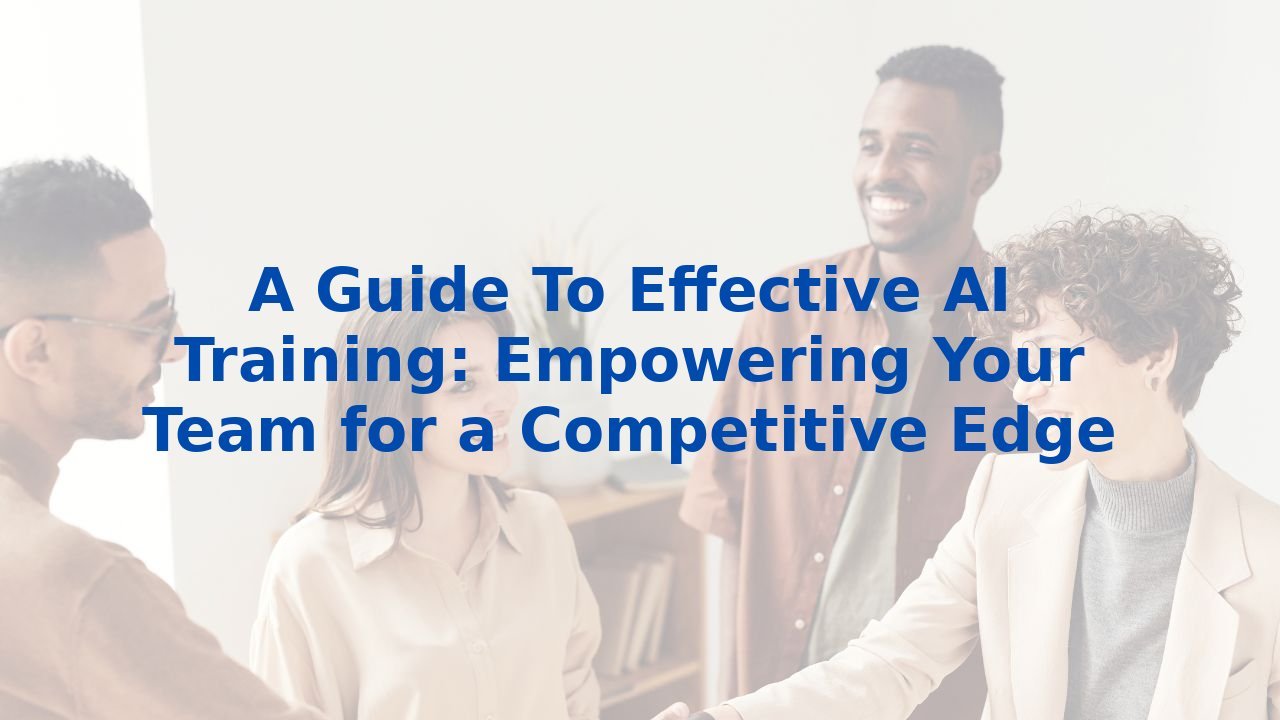A Guide To Effective AI Training: Empowering Your Team for a Competitive Edge
A Guide To Effective AI Training: Empowering Your Team for a Competitive Edge
In a world where technology evolves at breakneck speed, organizations are continually seeking innovation to remain competitive. One technology that has emerged as a game-changer is Artificial Intelligence (AI). However, harnessing AI's potential is not simply about acquiring the latest tools; it requires a foundational understanding and effective training of your team. This guide delves into how effective AI training can empower your organization, streamline business processes, and improve overall efficiency.
The Importance of AI Training in Enhancing Business Efficiency
Embracing AI is crucial for organizations aiming to elevate their performance. Numerous businesses recognize the profound impact AI can have on productivity and efficiency. However, without proper training, these tools may remain underutilized or misapplied, leading to complications rather than solutions.
Understanding the Need for AI Training
To leverage AI effectively, organizations must first acknowledge the urgent need for training. AI technologies can transform workflows but require skilled personnel to drive their success. Teams equipped with the right knowledge can become more efficient, confident, and innovative in their tasks. Recognizing this, businesses can champion a culture that embraces continual learning, essential for thriving in this digital age.
Identifying Business Needs
The initial step in implementing an AI training program is identifying your organization’s specific needs. Conducting a thorough analysis of existing pain points—such as repetitive tasks or bottlenecks—enables targeted solutions. For example, if your organization faces challenges in data analysis, focusing on AI tools designed for analytics can streamline these processes, allowing your team to allocate resources more effectively.
Selecting Relevant AI Tools
With a myriad of AI tools on the market, selection can often be overwhelming. However, aligning the choice of tools with the identified needs of your team is crucial. This means looking for tools tailored to your specific challenges; whether improving customer support, enhancing project management, or streamlining content creation, the right tools will amplify the benefits AI offers.
Providing Training and Support
Equipping your team with AI tools is just the beginning. Comprehensive training is necessary to ensure that employees understand not only how to operate these tools but also the broader impact of AI within their roles. Training programs should encompass technical knowledge and ethical considerations such as data privacy, ensuring that your workforce can navigate the challenges that accompany AI integration.
Setting Clear Expectations
Clarifying the role of AI in your organization is fundamental for successful adoption. Establish clear guidelines regarding how AI tools will be integrated into workflows, which tasks they will automate, and the anticipated outcomes. By fostering an open dialogue around expectations, employees will better understand their objectives and how to achieve them with AI’s assistance.
Continuous Improvement
AI is not static; it evolves and presents new capabilities regularly. To remain competitive, it is essential to view training as an ongoing process. Launch regular workshops or seminars to keep your team abreast of the latest advancements and refinements. A commitment to continuous improvement ensures that employees remain proficient and engaged, armed with fresh insights that drive innovation.
Benefits of AI Training
AI training extends beyond mere productivity gains; the advantages are multifaceted:
- Enhanced Productivity: By automating mundane tasks, employees are liberated to center their focus on higher-level strategic initiatives.
- Improved Decision-Making: AI can facilitate real-time analytics, empowering teams to make informed choices swiftly.
- Increased Creativity: By removing routine responsibilities, AI opens the door for exploration and innovation, allowing employees to develop new business strategies.
- Better Customer Experience: Enhanced AI capabilities can personalize interactions and speed up support, making your brand more accessible and customer-centric.
The Role of Employee Training in AI Adoption
Successful AI adoption hinges on an organization's commitment to training its workforce. Well-structured training initiatives that consider various roles within the organization ensure that every employee can leverage tools relevant to their tasks. From front-line staff needing operational insights to executives requiring strategic understanding, tailored training fosters a unison approach to AI integration.
Conclusion
In summary, effective AI training is not optional; it is essential for organizations aiming to maintain a competitive edge in today’s dynamic landscape. By focusing on identifying specific needs, selecting suitable tools, providing robust training, establishing clear expectations, and committing to continuous learning, organizations can unlock the transformative power of AI. Ultimately, the future of work is intertwined with AI, and positioning your team with the right skills is the key to not just surviving but thriving in this new era.
To learn more about customizing AI training for your entire organization, visit our homepage.



